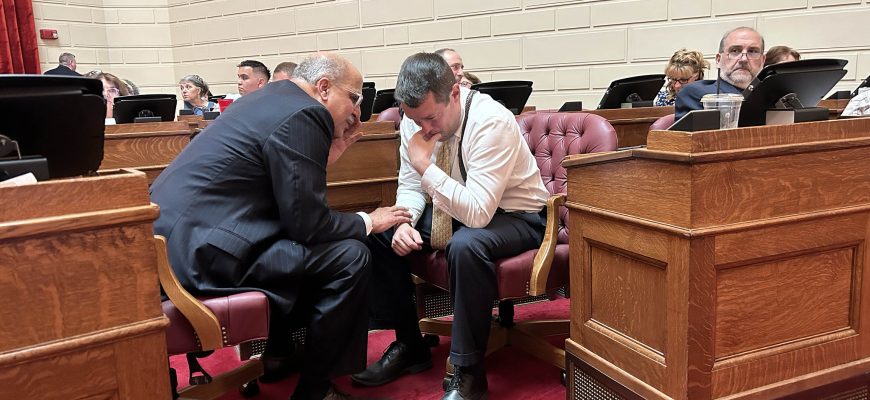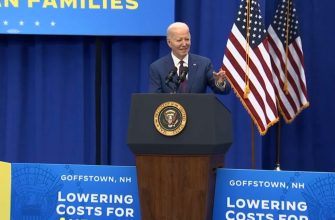A record $14 billion tax-and-spend plan flew through the Rhode Island House of Representatives on Friday in record time, with strong support across the political spectrum.
The 68-4 vote on the fiscal 2024 budget came after several hours of mostly amicable debate and relatively few amendments. Leaders on both sides of the political aisle praised the plan for its historic investments in housing and education as well as small-business tax relief and customer rebates to help combat rising energy costs.
“Our goal with this budget is to support Rhode Islanders’ needs while responsibly preparing for our future,” House Speaker K. Joseph Shekarchi said in a statement. “Our top priority, of course, is addressing our housing crisis, and we have worked hard, in collaboration with Governor McKee and our colleagues in the Senate, to identify the most effective ways we can direct the funding we have toward solutions that will help create more affordable housing access. This budget also strengthens our efforts to provide educational opportunities in K-12 and higher education and supports businesses, working Rhode Islanders, retirees and those struggling to meet their families’ basic needs.”
The $14.0 billion spending plan is 1.4% more than the $13.8 billion proposal Gov. Dan McKee introduced in January, with the increase mostly due to reallocating money left unspent from the fiscal 2023 budget.
While Shekarchi stressed the need to be “realistic,” legislators managed to stave off many tough choices for at least another year thanks to the windfall of federal COVID-19 stimulus funds and surplus cash from fiscal 2023 tax revenue.
House Minority Leader Mike Chippendale, a Foster Republican, also lauded the spending plan for making the “responsible” choice to designate the influx of funding on one-time expenses rather than ongoing programs. Indeed, legislators expect to face narrower margins in future years, with policy experts warning of an economic slowdown on the horizon.
“Next year will present formidable budgetary challenges for Rhode Island, where we must maintain a keen focus on lowering the total budget costs going forward, as the one-time federal funds will no longer be available,” Chippendale said in a statement.

Four of the nine House Republicans – Patricia Morgan, George Nardone, Robert Quattrocchi and Brian Rea – voted against the budget.
Windfall helps smooth debate
Lawmakers are making the most of a one-time windfall through tax relief to small businesses and on energy bills, alongside efforts to combat the housing crisis and focus education resources on the most vulnerable students and families.
Housing programs feature prominently, with a separate budget article enshrining the newly created Rhode Island Department of Housing and giving Housing Secretary Stefan Pryor broad discretion to oversee a tranche of new programs.
In addition to the 14-bill legislative package of housing reform policies championed by Shekarchi, the budget preserves the $2.7 million McKee proposed to hire staff for the newly created state Department of Housing. It also incorporates the $29 million package of housing incentives – including a tax credit for developers that build low-income housing projects – introduced last month by McKee and Housing Secretary Stefan Pryor. This is on top of the $250 million in federal recovery funds the department is already charged with spending on housing and homelessness solutions.
A separate, $10 million set aside added by legislators creates a revolving fund administered by the state housing department to help with “shovel-ready” housing projects.
The much-maligned education funding formula is also getting a facelift, though advocates insisted a more holistic overhaul remains on their to-do lists. The $1 billion earmark in local school aid includes extra funding for multi-language learners and special education, while setting aside $20 million to offset enrollment declines for students who opt to go to charter schools.
Rep. Enrique Sanchez, a Providence Democrat and Providence Public Schools teacher, said he was “disappointed” by a lack of comprehensive reform to the education funding formula but supported the funding nonetheless.
Winner: Rhode Island College
The budget also includes two new programs aimed at strengthening Rhode Island College, which has struggled in recent years from waning enrollment (and in turn, revenue from tuition dollars) alongside leadership turnover and low morale. Based on amendments introduced by McKee, the spending plan includes a $4 million cybersecurity education and workforce training program out of RIC, to be headed by former U.S. Rep. Jim Langevin, plus $10.4 million mostly from stimulus funds, to offer free tuition to in-state, full-time RIC students for their third and fourth years.
On the tax relief side, lawmakers overwhelmingly backed a tax break for small businesses that allows them to bypass paying taxes on up to $50,000 of tangible assets – think office furniture, computers, and kitchen equipment. A four-month suspension on the gas and electricity gross receipts tax tacked on to customers’ monthly bills also won support, though legislators shifted the $35.6 million cost to offer the rebates from the fiscal 2023 budget, as McKee proposed, to fiscal 2024.
McKee’s unpopular push to reduce the state sales tax appeared to have little backing among lawmakers, none of whom attempted to reintroduce the .15-percentage point trim in sales taxes during debate Friday.
Indeed, relatively few amendments were proposed to the version passed out of the House Finance Committee last week, many of them technical word changes. One substantive change came via Shekarchi amid activists’ calls for early childhood education funding. Shekarchi’s amendment adds $3 million to Head Start and Early Head Start funding as well as a $4 million pilot program to give free child care to child care providers who earn less than 300% of the federal poverty limit.
Loser: Retired state workers seeking COLAs
Retirees who sought to have their cost-of-living adjustments resurrected were not so lucky. A small group of retired teachers and government workers gathered outside the House chambers on Friday, bearing signs urging lawmakers to bring back the annual COLAs that were stricken as part of 2011 pension reforms led by then-treasurer Gina Raimondo.

One lawmaker heeded their calls to action in the one contentious moment of an otherwise civil, or even friendly, discussion.
Debate grew heated at times, with several calls for points of order as Rep. Charlene Lima, a Cranston Democrat and retired Providence Public Schools teacher, included ad hominem attacks against lawmakers in her proposal to bring back COLAs.
Lima’s tone grew loud and angry after both of her proposed amendments, which would have restored the defunct COLAs in some fashion, were tabled rather than being put to lawmakers for a vote.
“They are screwing you again,” she said of lawmakers who supported the tabling of her amendments. “That means they want to shut me up, they don’t want to help you, and they don’t want you to know that they don’t want to help you, so they’re going to hide.”
They are screwing you again.
– Rep. Charlene Lima, a Cranston Democrat and retired Providence Public Schools teacher, who tried unsuccessfully to bring back COLAs
Several other lawmakers who are retired state workers and teachers expressed their own frustrations with the lack of COLAs, stressing the importance of the budget-commissioned order requiring the Rhode Island Treasurer’s office to study and make recommendations on the 2011 pension reform.
“This analysis would help us determine if stated goals are being met, inform any changes needed to improve the programs, and address any unintended consequences of the act including any ability of the state to attract and retain a stable workforce,” said House Finance Chairman Marvin Abney, a Newport Democrat.

The pension plan approved Friday includes a modest increase in payouts to retirees, adjusting the payment to be made annually rather than every four years.
Winners: AG, hospitals and climate
Another big winner in the spending plan is Attorney General Peter Neronha’s office, which will get 15 of the 20 new staffers Neronha asked for, including a four-person cold case unit, with funding coming from the state opioid settlement with Purdue Pharma.
Meanwhile, struggling hospitals will get a $14 million injection of state and federal aid, and cities and towns will get $20 million in grants for road and sidewalk repairs.
The Executive Climate Change Coordinating Council, an appointed panel charged with helping the state meet its decarbonization goals, will get $3 million in the fiscal revised 2023 budget from state gas cap-and-trade revenues. This is on top of a $4.5 million allotment in fiscal 2024.
Losers: RIPTA, Tidewater Landing, and more
The spending plan does not include designated funding for the financially endangered Rhode Island Public Transit Authority, despite projections that the agency is headed toward a fiscal cliff. Nor does funding for construction and redevelopment projects including Pawtucket’s Tidewater Landing, the downtown Superman building and the Cranston Street Armory building in Providence.
A $25 million boost McKee had proposed giving to the South Quay marine terminal project in East Providence was axed by lawmakers. Lawmakers also got rid of McKee’s plan to suspend the 3-cent increase in the state gas tax.
The budget now heads to the Rhode Island Senate, with a committee review likely early next week.
GET THE MORNING HEADLINES DELIVERED TO YOUR INBOX








